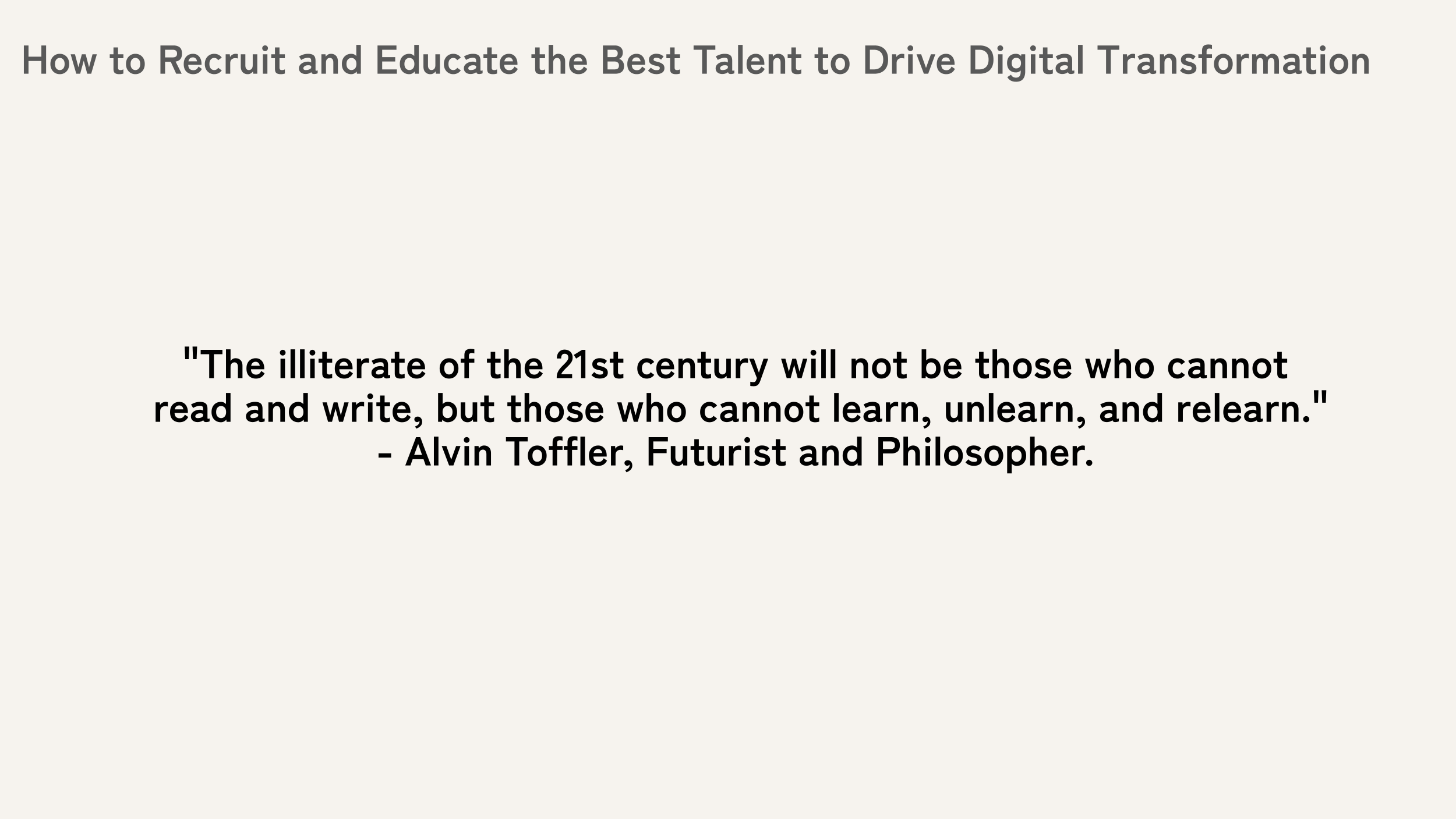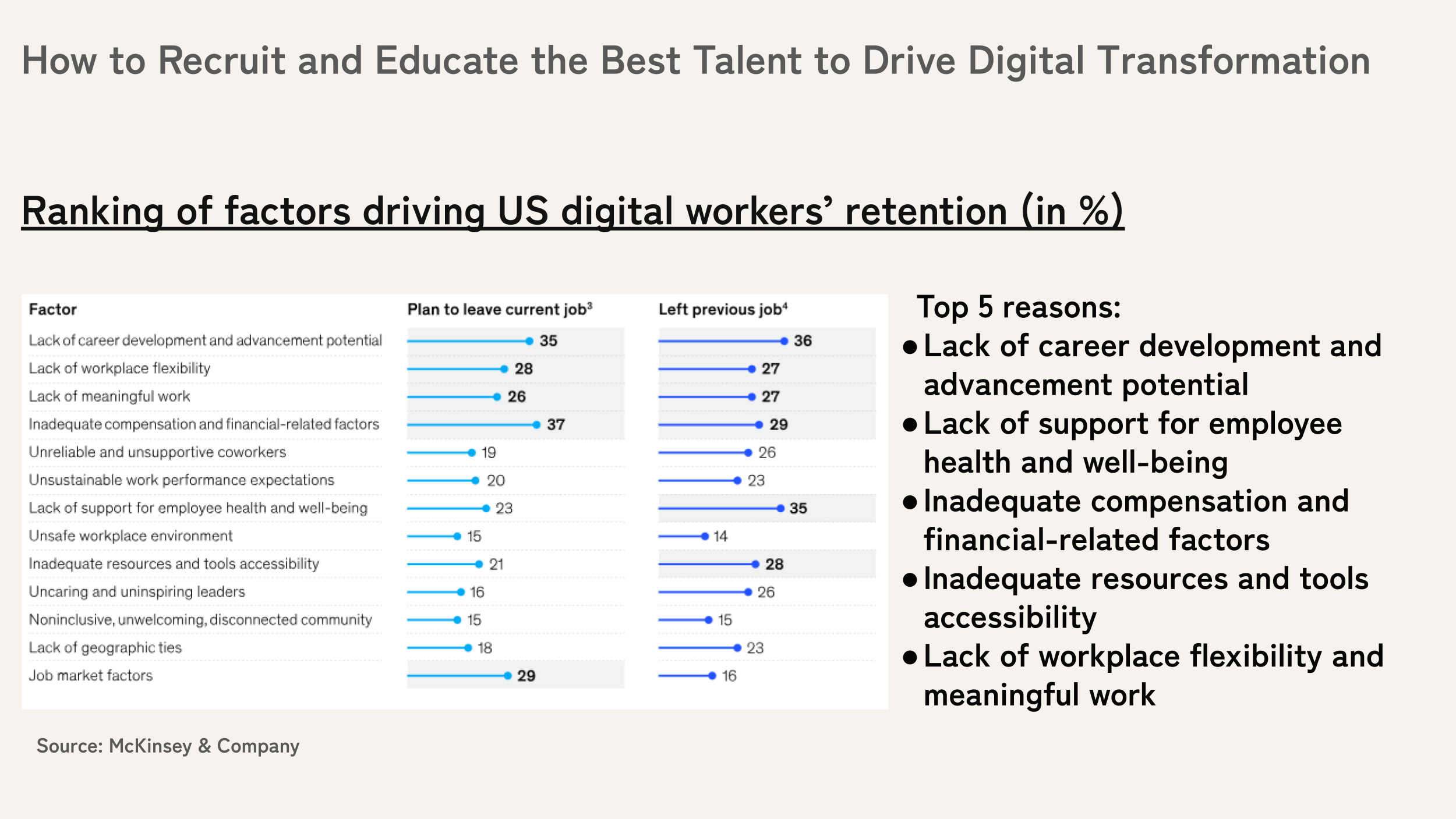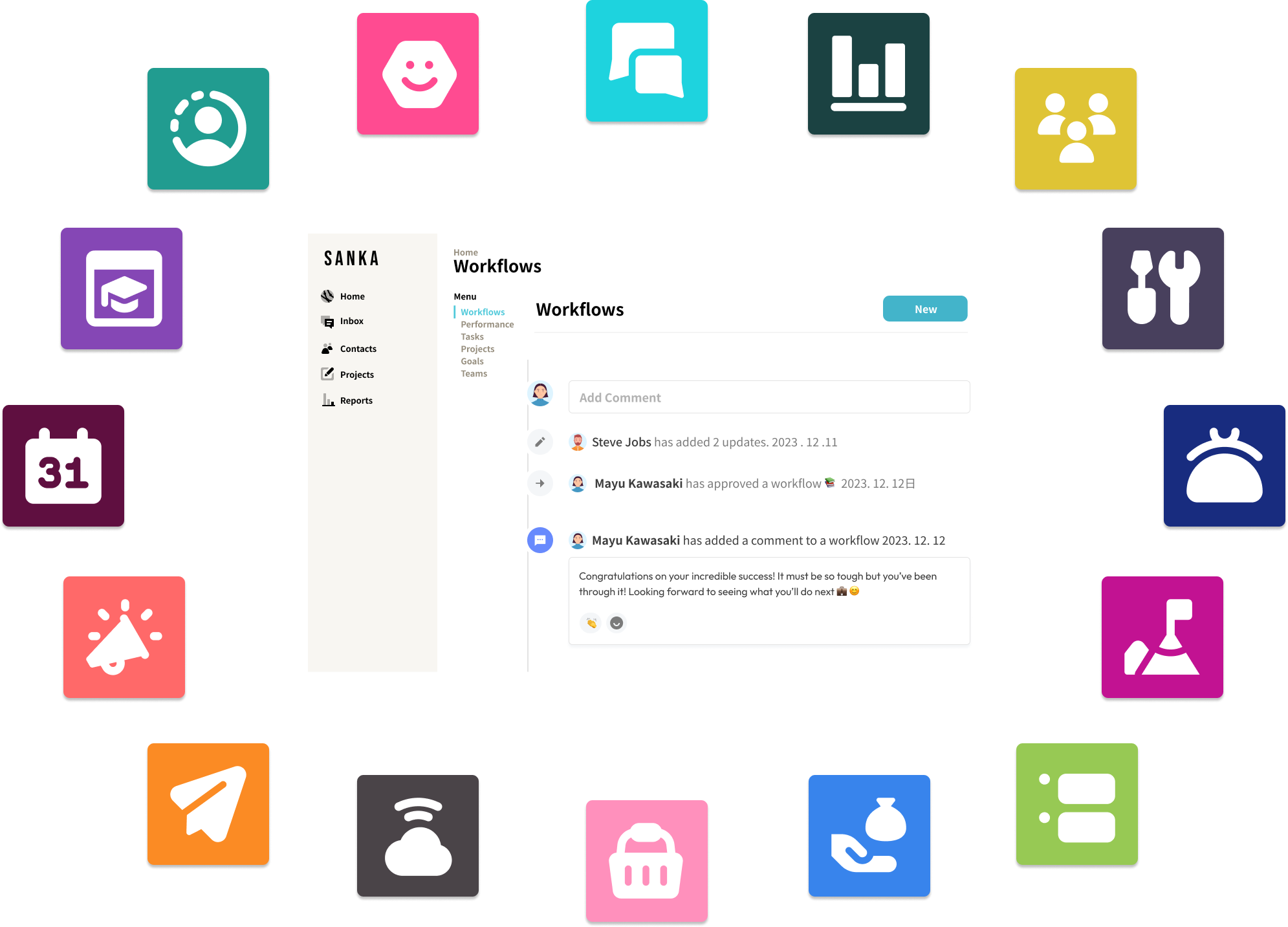Introduction
As the digital revolution continues to redefine business landscapes globally, having the right talent to drive digital transformation becomes critical.
It's not the most digitally competent that will survive, but those who are most adaptable to change.
As companies strive to adopt advanced technologies and processes, having the right digital transformation talent is crucial for success.
Organizations must recruit and educate professionals with the skills and mindset required to drive their digital initiatives forward.
In this blog post, we'll explore how companies can find, retain, and develop the best talent for digital transformation.
The Need for Digital Talent
As we propel into the digital age, companies need to hire individuals who possess a unique blend of hard and soft skills.
Hard skills range from data analytics, machine learning, coding, and cybersecurity, while soft skills focus on creativity, problem-solving, adaptability, and digital literacy.
There's an increasing demand for professionals with advanced digital skills and expertise to navigate digital transformation.
However, a talent gap exists. According to a McKinsey study, only 16% of companies believe they have the skills required for their digital transformation efforts.
To stay competitive, organizations must have a pool of talented individuals who are tech-savvy and can cope with rapid technological advancements.
Here are the reasons why companies need digital talent, focusing on how they can unlock growth and innovation and truly thrive in the new digital normal.
#1 Driving Digital Transformation
Success in today's business environment often hinges on an organization's ability to transform and evolve in harmony with advancements in technology.
Access to top digital talent enables businesses to drive digital transformation initiatives, ensuring that the latest trends and technologies are not only integrated but leveraged to their full potential.
Digital talent plays a pivotal role in the strategic planning and implementation of digitally enabled systems and infrastructure, ultimately helping organizations establish a strong digital presence and stay abreast of the ever-evolving digital landscape.
#2 Enhancing Customer Experiences
The digital age has irrevocably shifted consumer expectations, with customers now demanding seamless, real-time experiences across multiple channels.
Digital talent can help create engaging user interfaces, enhance personalization, and streamline customer touchpoints, both online and offline.
Moreover, digital talent can help organizations leverage artificial intelligence (AI) and machine learning (ML) to analyze consumer behavior and preferences, making well-informed strategic decisions that boost customer satisfaction and loyalty.
#3 Optimizing Operations
Digital talent can enable businesses to optimize their operations by applying advanced technologies to increase productivity, eliminate inefficiencies, and minimize costs.
Whether it's automating repetitive tasks or designing intelligent systems that adapt in real-time, digital expertise is essential to realizing the full potential of technological solutions across various business processes.
For instance, a digital workforce proficient in data analytics can help organizations gather insights from vast amounts of data to make informed decisions regarding resource allocation, inventory management, and pricing strategies, ultimately improving overall operational efficiency.
#4 Fueling Data-Driven Decisions
In the Information Age, data is the new currency. Having access to digital talent skilled in data analytics empowers companies to harness the full potential of their data, allowing them to make informed, data-driven decisions that drive growth and success.
By combining quantitative insights with instinctive business acumen, digital talent can help organizations identify areas that need improvement and opportunities that may have previously gone unnoticed.
This marriage of data and decision-making can lead to more strategic planning, better allocation of resources, and smarter investments.
#5 Encouraging Innovation
Digital talent serves as a catalyst for innovation, bringing fresh perspectives, ideas, and solutions to the table.
Professionals who possess a combination of digital skills and industry knowledge can uncover new ways to capitalize on emerging technologies and stay ahead of the competition.
Innovation is what sets successful companies apart, and having a skilled digital workforce can mean the difference between a business that thrives and one that is left behind.
Digital talent can help identify new business models, products, and services, ultimately contributing to overall market share growth.
#6 Strengthening Cybersecurity
As digital technology permeates every aspect of a business, having the right people in place to combat cyberthreats is more important than ever.
The increasingly interconnected nature of our world puts organizations at greater risk for cyberattacks that can have devastating consequences on business operations and reputations.
Harnessing the expertise of digital talent in the cybersecurity domain is essential for organizations to protect sensitive information and maintain their brand value.
#7 Boosting Talent Attraction and Retention
A company's ability to attract and retain top talent is heavily influenced by its reputation as a technologically advanced and digitally mature organization.
By prioritizing digital skills and innovation, companies can send a strong signal to the talent pool that their organization is future-oriented, agile, and an ideal place to develop and showcase digital skills.
Additionally, the ability to provide digital skills training can act as a key differentiator and a powerful retention tool, ensuring that employees remain engaged, motivated, and loyal to the company.
The Best Strategy to Recruit and Educate Digital Talent
Traditional hiring practices often fail to address the nuances of acquiring digital talent.
The key lies in devising a recruitment strategy that is in sync with the changing dynamics of the digital landscape.
Investing in your workforce's education can not only enhance your organization's digital capabilities but also improve employee satisfaction and loyalty.
To drive successful digital transformation, companies need to continuously upskill and reskill their employees.
Here, we delve into the best strategies to recruit top-tier digital talent.
#1 Embrace Digital Channels
The first step towards acquiring digital talent is to tap into digital channels. Use job social networks such as LinkedIn, as well as job boards, online communities, and even social media platforms.
Engage with potential candidates where they are, whether it's on professional forums or personal social accounts.
Leverage algorithms and AI-powered recruitment tools to discover and reach out to candidates that align with your requirements.
#2 Showcase a Digitally Driven Culture
Today's digital talent seek more than just a job; they desire an engaging workplace where they can envision long-term growth.
Develop a strong employer brand that showcases your digital capabilities. Highlight your company's innovative projects, learning opportunities, and successes in adopting digital technologies.
Encourage current employees to share their experiences on digital platforms.
This not only builds credibility but also offers potential candidates a glimpse into your digital-driven culture.
#3 Offer Competitive Remuneration and Benefits
Digital skills are in high demand and often command higher compensation packages than traditional skills.
To attract and retain the creme de la creme, you need to offer competitive remuneration, benefits, and growth opportunities.
This may include benefit packages tailored to digital professionals and flexible working arrangements that demonstrate an understanding of their lifestyles and preferences.
#4 Adopt a Skills-Based Approach
Rather than solely focusing on a candidate’s educational background or previous roles, adopt a skills-based approach.
Look for candidates who possess the necessary digital skills such as data analytics, SEO expertise, digital marketing, coding, etc., regardless of their traditional professional qualifications.
This widens your talent pool and enhances your chances of finding candidates with a unique blend of skills that can provide fresh perspectives and innovative solutions.
#5 Streamline Your Application Process
Unnecessarily lengthy and complicated application processes can discourage top digital talent from applying.
Simplify and streamline your application process. Utilize digital tools to speed up application reviews and provide timely responses.
Provide clear, concise job descriptions and expectations to allow candidates to decide whether your position suits their skills and career aspirations.
#6 Invest in Training and Development Programs
Consistent and targeted training is key to nurturing the digital skills of your workforce.
According to a study by the Capgemini Research Institute, only 56% of organizations are taking adequate steps to adapt their employees’ skills to the changes brought by automation.
To meet the challenge, organizations must invest in training and development programs aimed at equipping employees with the latest industry trends and skills.
Consider partnering with educational institutions, training providers, or online learning platforms to offer comprehensive training programs for digital skills.

#7 Foster Collaboration and Innovation
Digital talent often thrives in collaborative environments that champion innovation.
Create opportunities for employees to work on cross-functional teams and encourage the sharing of ideas across these teams.
Demonstrate your organization's commitment to innovation by showcasing accomplishments stemming from the implementation of ground-breaking digital initiatives.
#8 Fast-Track Digital Recruits to Leadership Roles
The current supply-demand disconnect in the digital talent market presents unique challenges.
A report by McKinsey revealed that in March 2023, the tech unemployment rate was as low as 2.2 percent, compared with the national average of 3.5 percent.
This tight labor market puts the onus on organizations to refine their recruitment strategies to have a competitive edge.
Positioning digital recruits in leadership roles can speed up transformation, boosting your organization's digital maturity.
This not only provides them with a clear career progression path but also ensures that your business strategy is steered by individuals well-versed in navigating the digital landscape.
#9 Leverage Real-world Scenarios
Incorporate real-world scenarios in your education program to ensure the skills being taught are relevant and immediately applicable to your organization's context.
This could be through case studies, simulations, or projects that mirror actual on-the-job challenges.
Real-world scenario-based learning allows your employees to practice skills in a controlled environment, increasing their confidence and readiness to apply those skills in their job roles.
#10 Offer Ongoing Support
Providing ongoing support after the completion of the educational program is crucial in reinforcing learning and ensuring that newly acquired skills are successfully integrated into daily work.
Facilitate opportunities for employees to ask questions, seek advice, and share their insights with one another.
Offer mentoring programs and on-demand access to learning resources to help employees continuously hone their skills.
#11 Utilize Metrics to Evaluate Success
Track the effectiveness of your education initiatives by utilizing performance metrics and regular evaluations.
These may include improvement in job performance, increased productivity, better employee satisfaction rates, and reduced turnover rates.
This not only helps measure the impact of your investment in digital education but also provides critical insights for future improvements.
#12 Retain Your Top Talent
Recruiting digital talent is just the first leg of the journey. The real challenge lies in talent retention.
This involves designing a work environment that respects and harnesses their skills, provides opportunities for professional development, and values their contribution to the organization.

Conclusion
Incorporating digital talent into an organization is no longer a choice but a necessity.
With this specialized workforce, companies can enhance customer experiences, optimize operations, drive data-driven decisions, fuel innovation, strengthen cybersecurity, and attract top-tier talent.
Still, remember that it isn't just about having digitally savvy employees; digital transformation also requires employees to be agile, adaptable, and open to continual learning.
As the face of the digital age constantly changes, this mix of skills will allow businesses to not just survive but thrive.
By investing in the acquisition and development of digital skills, businesses can anticipate market trends, pioneer change, and remain at the forefront of their industry in this exponential era.
Embracing digital capabilities now will determine a company's success both in the present and the rapidly unfolding future.








